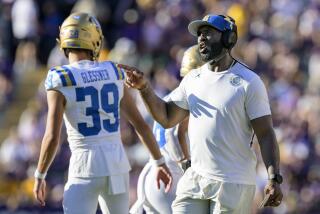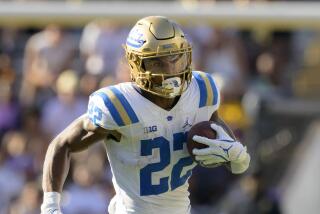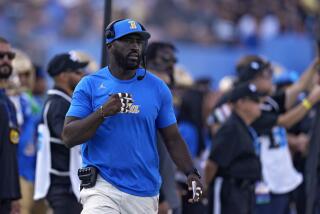
It’s a comeback story years, sometimes decades in the making.
Indiana hasn’t played in the Rose Bowl since its futile attempt to stop USC running back O.J. Simpson on Jan. 1, 1968, making the team’s return this week to face UCLA something of a now-or-never pilgrimage for those who played in that game.
“We have a very thin group of guys who are still around,” said Harry Gonso, the Hoosiers’ quarterback that day 56 years ago, “if you understand what I mean.”
With USC, UCLA, Oregon and Washington joining the Big Ten, their fans will visit Ohio State, Michigan, Penn State and other historic sites. Here’s a guide to all 18 stadiums.
Minnesota was once such a Rose Bowl regular — appearing in the New Year’s Day game as the Big Ten champion in 1961 and ’62 — that Dave Mona, then a freshman writing for the school’s student newspaper, decided not to splurge on the $49 round-trip train fare to Pasadena to attend the latter game.
“I casually said, ‘No, I won’t go this time — they go every year,’ ” Mona said, “having no idea that it would be more than 50 years later before they would be back.”
Iowa has played in the Rose Bowl only three times in the last half-century, making its return in early November a novelty on par with the team playing a game last season against Northwestern at Wrigley Field in Chicago.
“It’s amazing how many people are already making plans to go out there,” Hawkeyes coach Kirk Ferentz said this summer.
All three traditional Big Ten schools coming to the Rose Bowl this season to face conference newbie UCLA expect to bring their largest contingent of fans traveling to any road game in 2024, reflecting the stadium’s allure in pockets of the country used to longingly seeing the stadium on television.
“Compared to our other Big Ten road games, UCLA has far and away the biggest level of interest among our fans right now,” said Mike Wierzbicki, the Minnesota senior associate athletics director for external affairs who expects at least 10,000 Golden Gophers fans to attend the game on Oct. 12.
To capitalize on the interest, Minnesota’s athletic department is sponsoring two- and three-night travel packages that include accommodations at the JW Marriott LA Live, a group tour of Los Angeles and a pregame tailgate, complete with open bar, at Brookside Golf Club. There will also be a “’Sota Social” at Barney’s Beanery in Pasadena on the evening before the game.
Mark Jessen, a lifelong Golden Gophers fan, said he planned to attend every event on the itinerary to savor each moment leading up to kickoff and, if he’s lucky, a picturesque sunset over the nearby San Gabriel Mountains.
Greg Flugaur says he’s a nobody. Perhaps that’s true, but the well-connected Minnesota fan was the first to report USC’s interest in joining the Big Ten.
“My whole life, 61 years, I’ve dreamed of going, but it was for a different reason, right?” Jessen said, referring to the possibility of Minnesota making the trip as Big Ten champions. “It was because we had a good team and we were going to get to go to the Rose Bowl. And so at this age it’s like, well, I don’t know if that’s going to happen, especially when you look at our conference and what’s happened here.”
The Big Ten’s expansion and the accompanying demise of the Pac-12 means that teams can now only go to the Rose Bowl by playing UCLA in the regular season or by qualifying for the 12-team College Football Playoff, which will utilize the Rose Bowl game as a quarterfinal on Jan. 1.
At Big Ten media day, UCLA coach DeShaun Foster delivered a special welcome to the conference’s fans planning a return to Pasadena after many years away.
“You know, they should come out here and just take in Los Angeles and treat it like a vacation — even the players,” Foster said with a smile.

Indiana, Minnesota and Iowa do not have long histories against UCLA. The Hoosiers have never played the Bruins. Minnesota has faced UCLA just three times, including a 21-3 victory over the Bruins in the 1962 Rose Bowl. The only time Minnesota played UCLA on the road during the regular season, in 1978, the Bruins were still playing home games at the Coliseum.
Iowa has gone 2-7 against UCLA, including a 45-28 loss when the teams last met in the 1986 Rose Bowl, the Bruins’ most recent triumph in the game.
Ferentz, who was Iowa’s offensive line coach during the Hawkeyes’ 1982 Rose Bowl appearance after a 23-year absence, understands the pull of Pasadena for fans in the frigid Midwest.
“That was a huge thing,” Ferentz said of going back to the Rose Bowl, where the Hawkeyes haven’t played since a 2016 loss to Stanford, “so I think there’s that attraction for a lot of our fans — they’re going to love it, so I’m all for that.”
In a nod to the level of interest in the game, Delta Air Lines added a direct flight from Cedar Rapids, Iowa, to Los Angeles to accommodate Hawkeyes fans heading to Pasadena. Iowa has sold 2,700 tickets, according to school officials, with the rest of the Hawkeyes’ road games selling between 1,000 and 2,000 tickets. Many more fans wearing black and gold who live in Southern California are expected to show up on game day.
The large swaths of visiting fans inside the Rose Bowl will not only help fill a stadium that has set record lows for attendance in recent years — leading to the installation of giant tarps in each end zone — but also provide UCLA an essential infusion of cash from ticket revenue at a time when its athletic department faces a $167.7-million budget deficit.
UCLA quarterback Chase Griffin is launching an NIL venture called the 1919 Players Fund, which aims to support Bruins athletes and attract talent.
UCLA’s other conference home games this season will be against Oregon and USC, former Pac-12 rivals who are familiar with trips to Pasadena. The Ducks and Trojans are also known for bringing throngs of fans, meaning the Bruins could be in for a big attendance bump after averaging only 47,951 fans at the Rose Bowl last season. A school athletic official would not divulge season ticket sales figures for this season, citing an ongoing sales campaign, but said the expectation was for a 10% to 15% increase in season tickets sold from last year.
“One of the many benefits of being in the Big Ten Conference is a bigger audience, whether it’s Southern California-based Big Ten alumni and fans, or UCLA alumni in the other Big Ten locales,” UCLA athletic director Martin Jarmond said. “Some of the Big Ten schools have not had the opportunity to play in the Rose Bowl in decades, if ever, and there is no better setting for college football than the Rose Bowl. Having new opponents come out here is also exciting for our fans and our student-athletes, and we’re looking forward to starting new rivalries within the conference.”
More than half a century after he threw his last college pass, Gonso remains the only Indiana quarterback to play in the Rose Bowl. His memories of that day are fond … in terms of the weather.
“Fortunately, we had a lot of good sunshine,” said Gonso, now 76, “and unfortunately, we played against a very good team.”

USC had five players that would go on to be taken in the first round of the 1968 NFL draft, not to mention Simpson, a junior running back. Simpson’s second touchdown run — an eight-yarder in the third quarter — secured the Trojans’ 14-3 victory.
Gonso sends his regrets that he won’t be coming back next week; he’ll be watching on television from home in Indiana. The Hoosiers have sold a little more than 1,500 tickets, the most for any road game this season.
As (bad) luck would have it, Mona will miss Minnesota’s return after agreeing to host a fall colors tour in New England before the Big Ten schedule was released. He’s expected to return to Minneapolis a few hours before kickoff.
“I’ll get home in time to watch it on TV and keep my fingers crossed that the Gophers either win the Big Ten and get chosen to go to the Rose Bowl [as part of the CFP],” Mona said, “or more realistically, probably in two or four more years they’ll go back as a visiting team.”
Fortunately, Mona can hear all about what it was like to be there from Jessen, a longtime friend who will add the Rose Bowl to the list of college football meccas he’s visited. Clemson’s “Death Valley”? Yep. Texas’ Darrell K. Royal Memorial Stadium? You bet. Jessen also once saw Pete Carroll’s Trojans whip the Bruins at the Coliseum. Among Big Ten venues, he favors Michigan Stadium and Beaver Stadium.
“It’s 112,000 people in white,” Jessen said of Penn State’s home.
Jessen will head to Southern California as part of a group of 25 friends. Another friend has chartered three planes for about 600 more fans. They will be joined by a large contingent of Minnesota alumni who live in the Los Angeles area, most of whom have never seen their beloved team play in the Rose Bowl.
Win or lose, given their team’s decades-long absence, they all will have come back.














